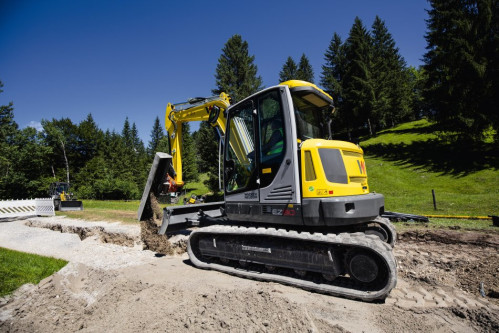5 popular jobs that can be done with a mini excavator
Although mini excavators are characterised by their small size, they are not cheap construction machinery. That is why it is extremely economically attractive to rent a mini-excavator. In return for a small rental fee, you will receive a machine tailored to your needs, which guarantees a significant acceleration in the pace of earthworks.

In terms of the activities that can be carried out, mini excavators are no different to their large counterparts. Here are 5 construction jobs that can be carried out using a mini excavator.
- digging and loading - mini excavators can handle earth moving up to a depth of 3.5m and can have a reach of more than 5m, enabling efficient digging of foundations, sewer trenches and the creation of narrow, precise trenches for electrical or telecommunications cables,
- moving, compacting and ramming - mini excavators come standard with a blade to move earth, aggregates or snow, and level the ground - with the addition of the appropriate attachments, the mini excavator can be used to compact a variety of materials,
- breaking, ripping - mini excavators can be fitted with jackhammers and special claws for breaking up asphalt, breaking up concrete pours or ripping out tree roots,
- handling - the mini excavator is ideal for handling various types of objects suspended from the bucket arm - with the appropriate grapples installed, it can be used for handling and setting concrete and stone kerbs,
- gouging - equipped with a wide enough bucket, the mini excavator is ideal for gouging the ground for paving pavements and paths.
Although mini excavators do not have the power of their large counterparts, they are effective in reducing the labour intensity of jobs that cannot be done with heavy construction equipment. When combined with a construction hauler, the mini-excavator makes a pair that can handle most jobs, for example on a single-family house construction site, levelling building sites, digging and clearing drainage ditches, and during garden and landscaping work.
7 key benefits of the mini excavator
In addition to the versatility of applications described above, mini excavators have many other advantages. Here are the 7 most important strengths of mini excavators:
- working in tight spaces - mini excavators will get into and be able to work in places where using a large excavator would be completely impractical,
- low risk of surface damage - the relatively low weight (1.5-3.5 tonnes) makes mini excavators very non-invasive to the surfaces they work on - unlike their large counterparts, they can work in areas sensitive to heavy loads, as well as on slightly waterlogged ground where heavy equipment could easily get stuck,
- low fuel consumption - small drive units are very fuel-efficient and therefore reduce operating costs significantly,
- ease of transport and garaging - their small size and low weight make them much easier to transport, without the need for specialised trailer units,
- ease of use - despite the many makes and models, mini excavators are easy to operate - it takes very little time to master the functions of a particular machine, so you can get to work quickly,
- lower repair costs - the miniaturisation of the individual components of the excavator translates directly into lower prices for spare parts and repair costs - the machine can be easily transported for repair, which is often much cheaper than calling a repair crew,
- low rental costs - the total cost of renting a mini excavator (rent, fuel, service) is so low that even for small-scale earthmoving jobs, it may turn out that renting the machine is an economically viable solution.
Don't forget that a mini-excavator cannot be operated by everyone: you need a Class III earthmoving machine operator's licence. To obtain these, you need to undergo a training course that ends with a state exam.